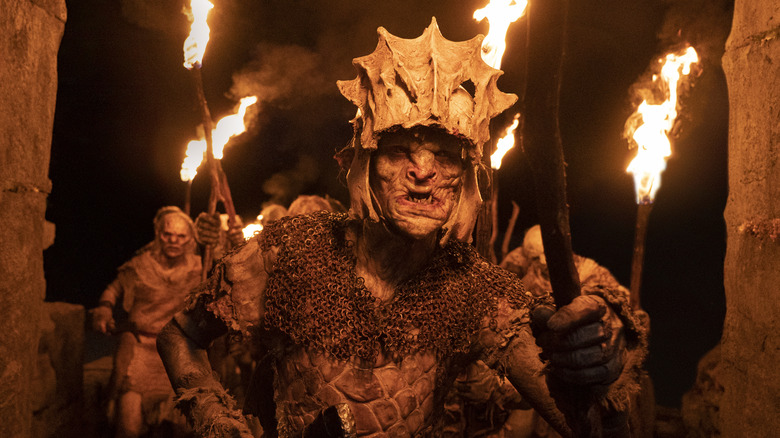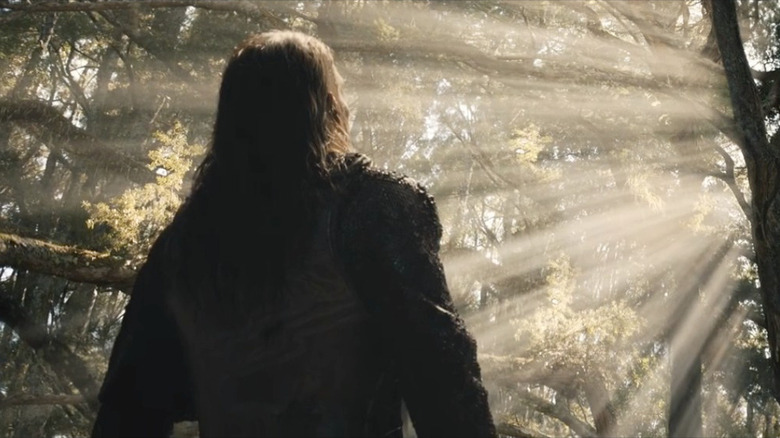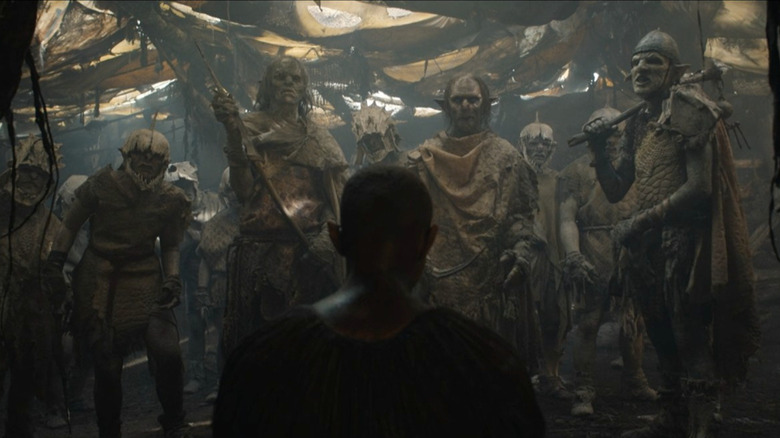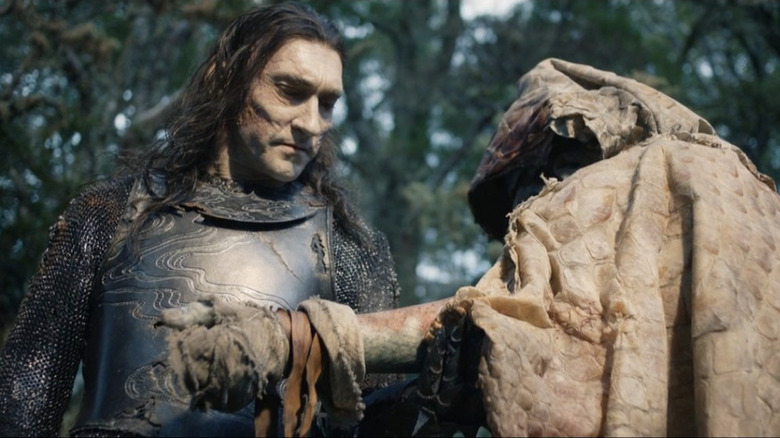The Rings Of Power Season 2 Reportedly Films Day Battles (& Why That's Bad News For Orcs)
Middle-earth is full of fighting. At various times across J. R. R. Tolkien's Legendarium, Angelic spirits engage in heavenly warfare, Dwarves attack Elves, Ents fight Dwarves, Elves war against Men, and Elves and Men even fight among themselves. If there's one consistent refrain across all of the military engagements of Middle-earth, though, it's that everyone fights the Orcs.
Amazon Prime's "The Lord of the Rings: The Rings of Power" has already had plenty of Orcish mischief in Season 1. At this point in Middle-earth history, the Orcs have been severely depopulated and are rebuilding their strength. They're on the rise again, and as Season 1 progresses, they make a bid for a new homeland in the form of the newly minted hellscape that is Mordor.
But the Orcs aren't going to stop there. Not by a long shot. According to a new leak from fan site Fellowship of Fans, they're going to be busy fighting again in Season 2 of the show. The scoop, which consists of three parts, starts by explaining that several key actors on the show have been spotted on battle sets as they film Season 2. It also claims the Elvish High King Gil-galad (Benjamin Walker) will ride right up to a group of Orcs during a battle and speak to them. The final part clarifies that: "For the first week and a half of recording at Shottesbrooke park, many of the battle scenes were filmed during the day not at night." It's a seemingly minor detail that could have huge ramifications for the Orcs themselves.
The Orcs in Middle-earth hate the sunlight
J. R. R. Tolkien's Orcs are famous for hating many things, including the sun. The book "The Return of the King" summarizes the creatures at the battle of the Pelennor fields by focusing on this feature with the phrase, "orcs that hated the sunlight." The Uruk-hai that Saruman breeds are special partly because they're able to operate in the light. And yet, even then, they only do so when they absolutely have to. When the Riders of Rohan destroy the same group shortly afterward, they deliberately wait for the sun to come up before attacking to give them an advantage.
This concept of Orcs and even Uruk-hai seeking out the darkness partly comes from the fact that the creatures are created before the sun even exists (during a dark time when the stars are the primary source of light). On top of that, their original master, Morgoth, built his strongholds deep underground and openly hated the threat of the sun and its powerful ability to illuminate his activities.
The anti-sun narrative is repeated ad-nauseam throughout the rest of Tolkien's writings, too. The Goblins in "The Hobbit," for instance, live in underground tunnels and don't come out until dark. Orcs throughout "The Lord of the Rings" and "The Silmarillion" are often depicted as cowering in the sunlight or avoiding it entirely, too.
The role of Darkness in Tolkien's stories
Of course, the Orcs aren't the only ones who hate the sunlight. Other evil creatures are similarly attuned to the darkness motif, both literally and figuratively. In J. R. R. Tolkien's world, darkness is very often associated directly with evil, while the light is generally connected to good, and this clear delineation takes on many different forms.
The Trolls in "The Hobbit," for instance, turn to stone when the sunlight hits them. In "The Fellowship of the Ring," Gandalf calls the Balrog a "flame of Udûn" and tells him to go back to the Shadow. In "The Two Towers" book, Shelob's lair is described as having an almost physical dark quality, worse than merely turning out the lights — and the demonic arachnid's vomit is literally described as darkness.
The biggest example of all (quite literally) is the point in "The Return of the King" where Sauron causes Mount Doom to belch forth enormous vapors that cover a huge part of the continent specifically so that his servants can attack Minas Tirith using the cloud as a 24/7 cover from the light.
Darkness is clearly associated with evil in Middle-earth, though not exclusively. The Dwarves, for instance, are heroes and "good guys," and they live underground. Hobbits burrow into holes, as well, even if they are well-lit living spaces. Nevertheless, it's the love of darkness, and, more importantly, hatred for the sun — as a living, mythic being — that helps to unify many of the antagonists of Middle-earth.
Taking the anti-sunlight narrative up a notch in The Rings of Power
While J. R. R. Tolkien's Orcs have always hated the sun, their avoidance of its rays is taken to new extremes in J.D. Payne and Patrick McKay's adaptation. In the Season 1 episode "Partings," the twisted Elf Adar (Joseph Mawle) is shown basking in the sunlight one more time before unleashing Mount Doom and creating a dark home for his Orc children. In the scene, he holds one of his follower's arms out, baring the skin to the sun's rays and watching it literally redden up and burn, vampire style.
This is a new spin on the traditional "Orcs hate the sunlight" concept. In the adaptation, they literally can't be in the sunlight or they'll be aggressively burned, presumably to an incapacitated state or even terminally. This is extrapolating on their canonical hatred and avoidance of the Sun, and it takes the issue to a whole new level. If the recent rumor is true, and a portion of the battle sequences are going to take place during the day, it could be a real issue for Adar's sun-sensitive children.
Orcs have never liked daytime fighting. Now that "The Rings of Power" has opted to take this well-defined reality and crank it up a notch, though, it could make things really complicated if the show starts featuring traditional nine-to-five work hours for its military engagements. That said, it's worth pointing out that the rumor only claims filming happened during the day. We won't know if it involves Orcs actually fighting in the sunlight or not until the season premieres — at this point, probably not until next year.



